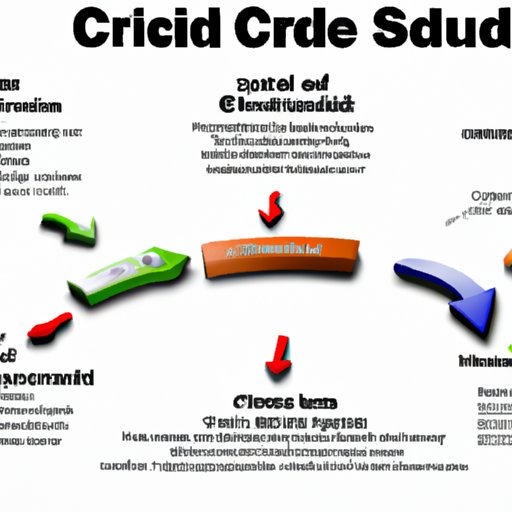Introduction
Credit is a type of financial arrangement that allows individuals and businesses to purchase goods and services without having to pay upfront. Instead, they are able to make payments over time, often with interest added. Credit can be obtained through various sources, including banks, credit unions, and other lenders. In this article, we will explore how credit works, what types of credit are available, and offer tips for improving your credit.

An Overview of How Credit Works
When you apply for credit, lenders use a credit report to determine whether or not they should extend you credit. A credit report is a record of your credit history, which includes details such as when you opened accounts, how much credit you have available, and how you’ve managed your debt in the past. Lenders use this information to assess the risk of lending you money, and decide whether or not to approve your application.
In addition to a credit report, lenders will also consider your credit score. A credit score is a three-digit number between 300 and 850 that reflects your creditworthiness. The higher your credit score, the better your chances of being approved for credit. It’s important to keep in mind that credit scores are not static; they can change over time depending on your financial behaviour.

Explaining the Different Types of Credit
There are two main types of credit: secured and unsecured. Secured credit is backed by collateral, such as a house or car. If you fail to repay the loan, the lender can take possession of the collateral. Unsecured credit does not require any collateral; instead, lenders rely on your creditworthiness to approve the loan. Common types of unsecured credit include credit cards and personal loans.
In addition to secured and unsecured credit, there are also other loan products available. For example, home equity loans allow homeowners to borrow against the equity in their homes, while student loans are designed to help students cover the costs of college tuition. Each type of loan product has its own set of terms and conditions, so it’s important to research all of your options before applying for credit.
The Benefits and Risks of Using Credit
Using credit responsibly can have many benefits. For one, it can help you build a good credit score, which may enable you to qualify for lower interest rates on future loans. Additionally, having access to credit can help you manage cash flow during difficult times, such as when you face an unexpected expense.
At the same time, it’s important to be aware of the risks associated with using credit. For example, if you fail to make payments on time, you could damage your credit score and incur additional fees. Additionally, if you carry a balance on your credit card, you may end up paying more in interest than the original purchase price. According to a survey conducted by the National Foundation for Credit Counseling, “nearly one-third (31%) of American consumers carry credit card debt from month to month.”
Understanding Your Credit Score
Your credit score is based on several factors, including payment history, credit utilization rate, length of credit history, and types of credit used. Payment history accounts for 35% of your credit score, so it’s important to always make your payments on time. Credit utilization rate, which is the amount of available credit you use, accounts for 30%. Keeping your utilization rate low can help improve your credit score. Length of credit history accounts for 15%, so it’s important to maintain accounts for at least two years. Finally, types of credit used accounts for 10%; a mix of different types of credit, such as installment loans and credit cards, can help boost your score.
It’s important to regularly check your credit score to ensure accuracy. You can obtain a free copy of your credit report from AnnualCreditReport.com, and you can check your credit score for free on websites such as Credit Karma and Credit Sesame.

Tips for Improving Your Credit
If you want to improve your credit score, there are several steps you can take. First, make sure to always pay your bills on time. Late payments can significantly damage your credit score, so it’s important to set up automatic payments whenever possible. Second, avoid maxing out your credit cards. High credit utilization rates can lower your credit score, so it’s best to keep your balances below 30% of your total credit limit. Finally, limit your credit inquiries. Every time you apply for credit, the lender will pull your credit report, and too many inquiries can hurt your score.
Building Good Credit Habits
In addition to the tips above, there are several other steps you can take to build good credit habits. For example, establishing a budget can help you stay on top of your finances and ensure that you don’t overspend. Additionally, setting up automatic payments can help you avoid late payments. Finally, monitoring your credit report regularly can help you spot any errors or potential signs of identity theft.
The Impact of Credit on Financial Well-Being
Having good credit can have a positive impact on your long-term financial goals. For example, having a good credit score may help you qualify for a mortgage or car loan, allowing you to purchase a home or vehicle. Additionally, having a good credit score may help you get better interest rates on loans, which can save you money in the long run. Finally, it’s important to remember that having good credit can also help protect you from identity theft. By monitoring your credit report regularly and taking steps to protect your personal information, you can reduce your risk of becoming a victim of identity theft.
Conclusion
Credit can be a useful tool if used responsibly. Understanding how credit works, the different types of credit available, and the benefits and risks of using credit can help you make informed decisions about your finances. Additionally, following the tips outlined in this article can help you improve your credit score and build good credit habits. For more information on credit and financial management, check out the resources provided by the Consumer Financial Protection Bureau.
(Note: Is this article not meeting your expectations? Do you have knowledge or insights to share? Unlock new opportunities and expand your reach by joining our authors team. Click Registration to join us and share your expertise with our readers.)
